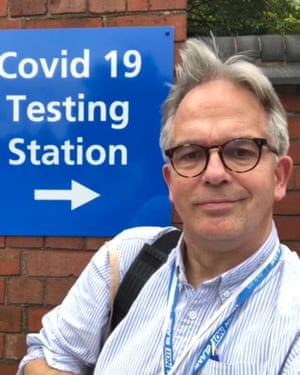
It was when Claire* was walking around central London before Christmas that it hit home how bad the situation would be in her hospital over the festive period. As hordes of shoppers gathered, the “penny dropped”, bringing into sharp focus the enormity of what the NHS would be facing this winter.
Her fears have become reality. The intensive care doctor says she and her colleagues have returned to the “fire fighting” they did at the start of the pandemic. It’s a case of NHS staff not eating or being able to go to the toilet for a whole shift, with the number of people requiring her help growing by the day.
News that the Oxford/AstraZeneca vaccine has been approved for use in the UK is welcomed by Claire, who has just had the first dose of the Pfizer/BioNTech vaccine. But, she says, it will do little to ease demand over the next few weeks.
“It does not make a difference this month,” she says. “I don’t know what lies ahead. I think that largely depends on what people do today [in terms of social distancing and following the rules].”
The situation she faces right now is trying to find more beds for those who need urgent help, and doing so without enough nurses. In normal times, intensive care nurses would deal with one patient at a time, now there are two to three patients per nurse.
“This means they cannot be as meticulous as they normally would be,” she says. “I worked Thursday, Friday, Saturday and Sunday last week and it was long days, just patient after patient coming in.”
Will Broughton, from the College of Paramedics, echoes Claire’s words when he describes the unrelenting pressure on NHS services, saying he was “exceptionally busy” on Tuesday evening.

He talks of delays at hospitals across London, saying he had to wait for two hours to get one patient inside from his ambulance. “One of my colleagues was waiting at one hospital for three hours after their 12-hour shift finished. There is no let-up, it’s just constant.”
He says he is encouraged by the vaccine news but that there needs to be “consistency” in how vaccines are rolled out to frontline healthcare staff, with many NHS workers worried about getting the virus and becoming unwell or even dying. He says he is aware of 25 paramedic deaths across the UK this year.
The Oxford vaccination programme will start on 4 January and will aim to reach millions of people in at-risk categories as quickly as possible. The emergence of a new variant of the virus causing high rates of infection has made vaccination even more urgent.
“I have not yet had a vaccine,” says Broughton. “The reality is that we are offered very short-notice appointments. I think yesterday there were appointments at one hospital but there was no way I or others could get there to have it on time,” he says, adding that they need to have a day off to get immunised.
“NHS staff must be prioritised as we are still seeing high levels of sickness and high numbers of people who are having to isolate or testing positive for the virus,” he says.
“It’s all very well to look forward to the spring and the supposed end of this phase of the pandemic, but the reality is that we still have a very busy winter to deal with and the next two, three or even four weeks will be incredibly busy.”

Dr David Nicholl, from the Doctors Association UK, which represents frontline medics, works in the Midlands and says a recent tweet from a fellow doctor, showing a rise in cases in the Black Country and Birmingham, made him realise that the scenes playing out in London could soon be at his door.
“It’s key that frontline staff get vaccinated,” he says without hesitation, adding that his trust had started immunising workers but the whole country needs to “upscale massively”.
“We have not yet seen the train wreck of Covid in London and it is inevitable that train is coming towards me right now,” he says.
* Not her real name


